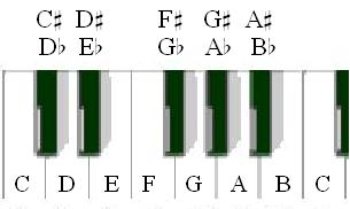Seconds
seconds - thirds - fourths & fifths - sixths - sevenths
Perfect Intervals - Augmented Intervals - Diminished Intervals
2nds: Major & Minor
Seconds are usually either major or minor. They are not as settling or mood specific as thirds, but they can add dissonance or tension.
A major second consists of 1 whole step; for example C to D is a major second (C to D = 1 whole step.)
A minor second consists of a 1 half step; for example, C to Db is a minor second (C to Db = 1 half step).
MAJOR SECONDS
Below are some examples of major seconds. Each one consists of
1 whole step:

MINOR SECONDS
Below are the same intervals EXCEPT they have been changed from major seconds to minor seconds. They each consist of 1 half step:

If necessary, use the keyboard diagram below to visualize the whole step, half step construction these intervals.

Below are some MAJOR SECONDS on various chromatic notes. Each of these major seconds consists of 1 whole steps. (Use the diagram above if necessary.)

Below are some MINOR SECONDS on various chromatic notes. Each of these major seconds consists of 1 half step. (Use the diagram above if necessary.)

MAJOR & MINOR SECONDS
The seconds below are either major or minor.
- Major = M
- Minor = m
The major seconds consist of 1 whole step - the minor seconds consist of 1 half step.

seconds - thirds - fourths & fifths - sixths - sevenths
Perfect Intervals - Augmented Intervals - Diminished Intervals
THE COMPLETE
ONLINE BUSINESS BUILDER
SBI
Hi and Welcome!
Fill out the form below to sign up for the free periodic
Player's Guide Newsletter!
Get tips and ideas about substitute chords, chord progressions and harmonic movement.
The Complete book of:
Scales, Chords,
Arpeggios & Cadences



